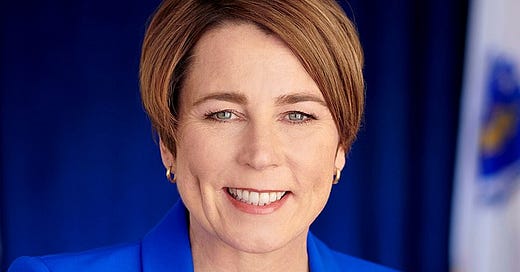George Regan’s fingerprints all over dustup at Boston City Hall | In coverage of Karen Read case, Canton paper stays above the fray | Bad mix - political happy talk and the state’s housing crisis | Boston hotel workers hit the picket lines | Quick hits |
News tips? Story ideas? Email us at sbvanvoorhis@hotmail.com
No silver bullet: Controversial state law touted by Healey and other leading pols is unlikely to be decisive in solving the housing crisis, critics say
Talk about winning the battle but losing the war.
In a big gathering last week in Somerville, Gov. Maura Healey and a bevy of state and local leaders celebrated a milestone of sorts.
The occasion? Seventy-five cities and towns across the Boston area approved the new multi-family zoning required under the 2021 MBTA Communities law, in theory opening their doors to new apartment and condo construction.
Healey touted the supposed “momentum” behind the new law, while Lt. Gov. Kim Driscoll proclaimed “we are winning this fight for housing,” per CommonWealth Beacon.
Ok, sure. Now along comes the Pioneer Institute. The free market, libertarian-leaning think tank is out Monday morning with a new report that finds that more than a few communities are choosing to comply with the law in ways that could make it difficult for developers to actually build new apartments and condos.
In particular, local leaders are conveniently placing their new multifamily zoning districts in parts of town that are already built out, either with commercial buildings or large apartment and condo complexes.
Additionally, the fact that 75 communities have passed the new, state-mandated multifamily zoning rules is not all that impressive.
That leaves more than 100 cities and towns having yet to pass any new multifamily zoning rules. In fact, several cities and towns are waiting to see what happens with a court case filed by Milton officials, who are challenging the law in court, noted Andrew Mikula, the study’s author.
To date, well more than three years after it was first passed, only 1,600 units have been built in Massachusetts under the MBTA Communities Act, Miluka told Contrarian Boston.
Nor are these towns likely to see an epic surge in new residential construction in the years to come resulting from the new law.
Sure, in theory more than 200,000 new housing units could be built - that is, if every single one of those 177 cities and towns complies with the law and developers build out every apartment or condo possible under the new zoning rules.
That number, realistically, will only be in the tens of thousands, if that.
“This is a long-term approach and it won’t on its own solve the Commonwealth’s housing shortage and our affordability problems,” said Pioneer Executive Director Jim Stergios. “But it could reduce upward pressure on housing costs by expanding supply.”
After decades of underbuilding, the median price of a home in Greater Boston is nearing $1 million.
We need to double the pace of new home, apartment and condo construction to solve the supply crunch, which will require far more extensive reforms of local zoning laws and regulations than are being contemplated now.
To her credit, Healey appointed an housing task force earlier this year to dig into the deeper issues; hopefully, that will yield further ideas about how to ease the local bottleneck in housing production.
That said, Healey needs to banish the political happy talk, level with the public, and make it clear that when it comes to the housing crisis, we are nowhere close to “winning.”
An uncharacteristically fiery move: Boston City Councilor Ed Flynn stirs chatter with his headline-grabbing demand to have his photo removed from City Hall
Keep reading with a 7-day free trial
Subscribe to Contrarian Boston to keep reading this post and get 7 days of free access to the full post archives.




